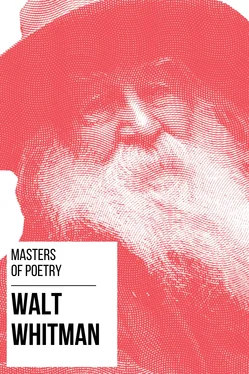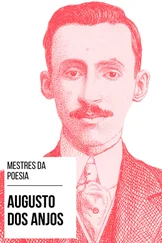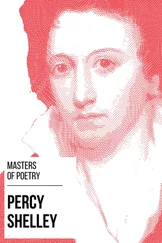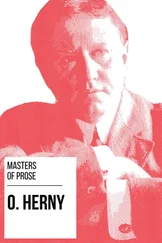British critics have spoken of Whitman's athleticism, his athletic temperament, etc., but he was in no sense a muscular man, an athlete. His body, though superb, was curiously the body of a child; one saw this in its form, in its pink color, and in the delicate texture of the skin. He took little interest in feats of strength, or in athletic sports. He walked with a slow, rolling gait, indeed, moved slowly in all ways; he always had an air of infinite leisure. For several years, while a clerk in the Attorney-General's Office in Washington, his exercise for an hour each day consisted in tossing a few feet into the air, as he walked, a round, smooth stone, of about one pound weight, and catching it as it fell. Later in life, and after his first paralytic stroke, when in the woods, he liked to bend down the young saplings, and exercise his arms and chest in that way. In his poems much emphasis is laid upon health, and upon purity and sweetness of body, but none upon mere brute strength. This is what he says "To a Pupil:"—
1. Is reform needed? Is it through you?
The greater the reform needed, the greater the Personality you need to accomplish it.
2. You! do you not see how it would serve to have eyes, blood, complexion, clean and sweet?
Do you not see how it would serve to have such a body and Soul, that when you enter the crowd,
an atmosphere of desire and command enters with you, and every one is impressed
with your personality?
3. O the magnet! the flesh over and over!
Go, mon cher! if need be, give up all else, and commence to-day to inure yourself to pluck, reality,
self-esteem, definiteness, elevatedness,
Rest not, till you rivet and publish yourself of your own personality.
It is worthy of note that Whitman's Washington physician said he had one of the most thoroughly natural physical systems he had ever known,—the freest, probably, from extremes or any disproportion; which answers to the perfect sanity which all his friends must have felt with regard to his mind.
A few years ago a young English artist stopping in this country made several studies of him. In one of them which he showed me, he had left the face blank, but had drawn the figure from the head down with much care. It was so expressive, so unmistakably Whitman, conveyed so surely a certain majesty and impressiveness that pertained to the poet physically, that I looked upon it with no ordinary interest. Every wrinkle in the garments seemed to proclaim the man. Probably a similar painting of any of one's friends would be more or less a recognizable portrait, but I doubt if it would speak so emphatically as did this incomplete sketch. I thought it all the more significant in this case because Whitman laid such stress upon the human body in his poems, built so extensively upon it, curiously identifying it with the soul, and declaring his belief that if he made the poems of his body and of mortality he would thus supply himself with the poems of the soul and of immortality. "Behold," he says, "the body includes and is the meaning, the main concern, and includes and is the soul; whoever you are, how superb and how divine is your body, or any part of it!" He runs this physiological thread all through his book, and strings upon it many valuable lessons and many noble sentiments. Those who knew him well, I think, will agree with me that his bodily presence was singularly magnetic, restful, and positive, and that it furnished a curious and suggestive commentary upon much there is in his poetry.
The Greeks, who made so much more of the human body than we do, seem not to have carried so much meaning, so much history, in their faces as does the modern man; the soul was not concentrated here, but was more evenly distributed over the whole body. Their faces expressed repose, harmony, power of command. I think Whitman was like the Greeks in this respect. His face had none of the eagerness, sharpness, nervousness, of the modern face. It had but few lines, and these were Greek. From the mouth up, the face was expressive of Greek purity, simplicity, strength, and repose. The mouth was large and loose, and expressive of another side of his nature. It was a mouth that required the check and curb of that classic brow.
And the influence of his poems is always on the side of physiological cleanliness and strength, and severance from all that corrupts and makes morbid and mean. He says the "expression of a well-made man appears not only in his face: it is in his limbs and joints also; it is curiously in the joints of his hips and wrists; it is in his walk, the carriage of his neck, the flex of his waist and knees; dress does not hide him; the strong, sweet, supple quality he has strikes through the cotton and flannel; to see him pass conveys as much as the best poem, perhaps more. You linger to see his back, and the back of his neck and shoulder-side." He says he has perceived that to be with those he likes is enough: "To be surrounded by beautiful, curious, breathing, laughing flesh is enough,—I do not ask any more delight; I swim in it, as in a sea. There is something in staying close to men and women and looking on them, and in the contact and odor of them, that pleases the soul well. All things please the soul, but these please the soul well." Emerson once asked Whitman what it was he found in the society of the common people that satisfied him so; for his part, he could not find anything. The subordination by Whitman of the purely intellectual to the human and physical, which runs all through his poems and is one source of their power, Emerson, who was deficient in the sensuous, probably could not appreciate.
The atmosphere of Whitman personally was that of a large, tolerant, tender, sympathetic, restful man, easy of approach, indifferent to any special social or other distinctions and accomplishments that might be yours, and regarding you from the start for yourself alone.
Children were very fond of him; and women, unless they had been prejudiced against him, were strongly drawn toward him. His personal magnetism was very great, and was warming and cheering. He was rich in temperament, probably beyond any other man of his generation,—rich in all the purely human and emotional endowments and basic qualities. Then there was a look about him hard to describe, and which I have seen in no other face,—a gray, brooding, elemental look, like the granite rock, something primitive and Adamic that might have belonged to the first man; or was it a suggestion of the gray, eternal sea that he so loved, near which he was born, and that had surely set its seal upon him? I know not, but I feel the man with that look is not of the day merely, but of the centuries. His eye was not piercing, but absorbing,—"draining" is the word happily used by William O'Connor; the soul back of it drew things to himself, and entered and possessed them through sympathy and personal force and magnetism, rather than through mere intellectual force.
Walt Whitman was of the people, the common people, and always gave out their quality and atmosphere. His commonness, his nearness, as of the things you have always known,—the day, the sky, the soil, your own parents,—were in no way veiled, or kept in abeyance, by his culture or poetic gifts. He was redolent of the human and the familiar. Though capable, on occasions, of great pride and hauteur, yet his habitual mood and presence was that of simple, average, healthful humanity,—the virtue and flavor of sailors, soldiers, laborers, travelers, or people who live with real things in the open air. His commonness rose into the uncommon, the extraordinary, but without any hint of the exclusive or specially favored. He was indeed "no sentimentalist, no stander above men and women or apart from them."
Читать дальше












